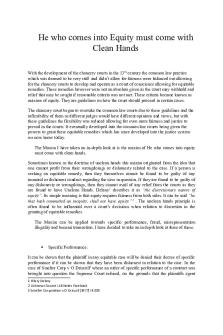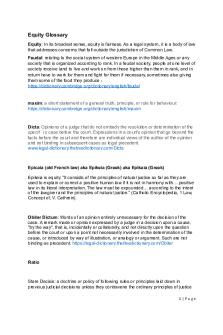Equity - Legal Maxim PDF

| Title | Equity - Legal Maxim |
|---|---|
| Author | Irham Zharfan |
| Course | Equity and trust |
| Institution | Management and Science University |
| Pages | 2 |
| File Size | 40.7 KB |
| File Type | |
| Total Downloads | 326 |
| Total Views | 904 |
Summary
What is equityThe general meaning for equity is fairness or natural justice. It represents the body of rules which exist by the side of law and it takes action or supersedes the law whenever there is conflict of the law with justice and fair play.In the narrow sense it means the principle of natural...
Description
What is equity The general meaning for equity is fairness or natural justice. It represents the body of rules which exist by the side of law and it takes action or supersedes the law whenever there is conflict of the law with justice and fair play. In the narrow sense it means the principle of natural justice which the court of common law fails to enforce. Maxim: He who seeks equity must do equity - The principle of this court is not to give relief to those who will not do equity. - This maxim means that whoever is seeking for relief must be willing to concede, recognize and admit equitable right of the defendant - Lodge v National Union Investment Co Ltd - In this case the plaintiff borrowed money from the defendant which is an unregistered money lender, and mortgaged some property with him. Under the MoneyLenders act 1900 this transaction is not legal - The plaintiff then sued the defendant asking back his securities / mortgage back to the defendant. - Court Held that the recovery could only be made when the plaintiff pays back the defendant the borrowed money.
He who comes into equity must come with clean hands - Means whoever has committed inequity will not get equity - Must only seek equity when you haven’t done something wrong in the issue. - Chettier v Chettier - In this case the defendant which is the father owned the maximum 99 acres of rubber land under the then administrative regulations. - To avoid the effect of regulations in being subjected to tax assessment owning more than 99 acres of rubber land, the father acquired 40 acres land and transferred into his son’s name on the understanding that it was to be held by him as a nominee. - When the father wanted to sell the land, the son refused to give him the power of attorney - The df brought an action for a declaration that his son held the land on trust for him. - In the privy council Lord Denning dismissed the df’s action on the ground of unclean hands. - The transfer was made for a fraudulent purpose...
Similar Free PDFs

Equity - Legal Maxim
- 2 Pages

Legal AND Equity Assignment
- 2 Pages

Maxim Clean Hand Doctrine
- 4 Pages

Maxims of Equity Equity Law
- 5 Pages

-equity assignment
- 1 Pages

Glossary Equity
- 2 Pages

Equity Notes
- 41 Pages

Equity LAW
- 48 Pages

Equity Assignment
- 10 Pages

Shareholder\'s Equity
- 17 Pages

Equity notes
- 58 Pages

Equity 3
- 4 Pages

Brand Equity
- 15 Pages
Popular Institutions
- Tinajero National High School - Annex
- Politeknik Caltex Riau
- Yokohama City University
- SGT University
- University of Al-Qadisiyah
- Divine Word College of Vigan
- Techniek College Rotterdam
- Universidade de Santiago
- Universiti Teknologi MARA Cawangan Johor Kampus Pasir Gudang
- Poltekkes Kemenkes Yogyakarta
- Baguio City National High School
- Colegio san marcos
- preparatoria uno
- Centro de Bachillerato Tecnológico Industrial y de Servicios No. 107
- Dalian Maritime University
- Quang Trung Secondary School
- Colegio Tecnológico en Informática
- Corporación Regional de Educación Superior
- Grupo CEDVA
- Dar Al Uloom University
- Centro de Estudios Preuniversitarios de la Universidad Nacional de Ingeniería
- 上智大学
- Aakash International School, Nuna Majara
- San Felipe Neri Catholic School
- Kang Chiao International School - New Taipei City
- Misamis Occidental National High School
- Institución Educativa Escuela Normal Juan Ladrilleros
- Kolehiyo ng Pantukan
- Batanes State College
- Instituto Continental
- Sekolah Menengah Kejuruan Kesehatan Kaltara (Tarakan)
- Colegio de La Inmaculada Concepcion - Cebu


